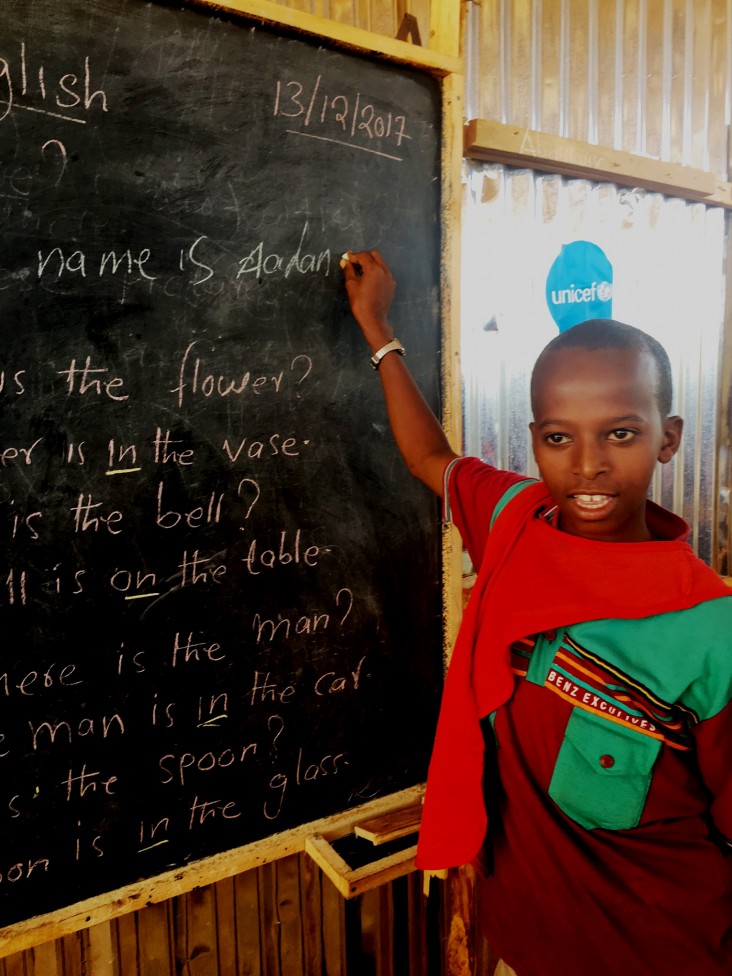Speeches Shim

July 2018 — Thousands of Somali families escaped their homes when the 2017 drought paralyzed their villages, destroyed their livestock, and led to their children’s deaths. Without food, water or income, many traveled long distances to settle in large internally displaced persons (IDP) camps in and around Baidoa, the capital of South West state.
Six months later, people are still arriving daily. It is estimated that up to 2,000 people a day since January 2018 have moved to the makeshift camps dotted with aqals, Somali huts made from sticks and grass mats. New arrivals are fleeing al-Shabaab recruitment campaigns targeting children, and escaping the devastating floods that have inundated crops and homes.
“Children arrive to the outskirts of Baidoa with only their shirt on their backs. They have not eaten for days nor attended any school for months or even years,” says a teacher at an IDP camp.
“The loss of learning opportunities to drought, floods, displacement and conflict has set students’ learning trajectories from months to years. However, children are resilient. Schooling provides normalcy in times of crisis,” explains Rina Dhalla, an education officer at USAID’s mission in Somalia.
Adan Kero, a young boy of 14, is from the remote village of Bulu Barako. One year ago, he walked 40 kilometers with his family. Escaping the devastation of his village, his family settled in Dusta camp on the outskirts of Baidoa.
Caring for his family’s goats on a daily basis, Adan had never gone to school. After a few months at the Dusta IDP camp, Adan enrolled with 140 other classmates in a new temporary learning center that was built with USAID funding.
Inside the learning center, he proudly picks up a piece of chalk and writes his name in English. “My name is Adan Kero, and I can read and write now,” Adan says confidently to the teacher.
Through its Alternative Basic Education for Pastoralists activity implemented by UNICEF, USAID is educating over 19,000 children, 8,700 of whom are girls. Ninety-six temporary learning centers were built in the Gedo, Bay and Bakool regions, and over 11,000 textbooks have been distributed in response to the needs of the displaced families and others living in hard-to-reach communities.
Like Adan, children who once struggled to get to school due to their remoteness, poverty, recruitment into armed groups, and economic and cultural pressures, such as child labor and early marriage, are now attending class in well-equipped and safe environments. Classrooms are filled with new desks and chairs, learning materials and even sports supplies for recreation. Each center also has separate latrines for girls and boys, and girls are provided menstrual hygiene kits to encourage their attendance throughout the school year.
The Alternative Basic Education for Pastoralists project educates students using a unique approach that reaches pastoralist and other marginalized, out-of-school children and youth who have missed out on primary school. An accelerated curriculum offers a quick way to catch up on learning, where six to eight years of primary education is taught in four. Community teachers are trained and receive materials that aid in instruction, and parents become strong advocates of education and the maintenance of their schools through community education committees.
LINKS
Follow @USAIDSomalia, on Facebook, on YouTube

Comment
Make a general inquiry or suggest an improvement.